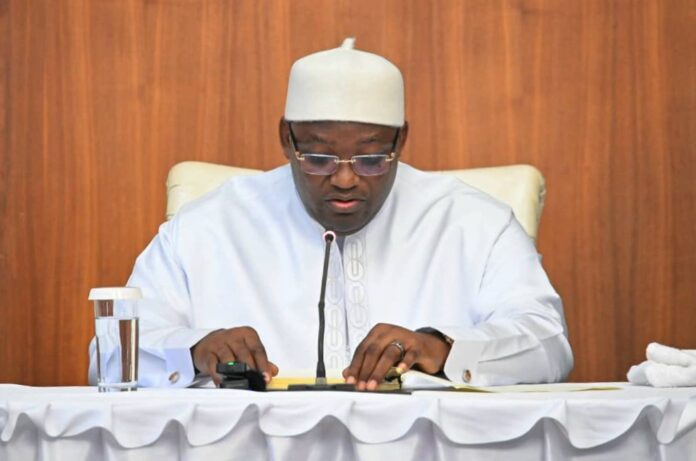Written by: The Fatu Network Newsroom
President Adama Barrow delivered his 2025 State of the Nation Address to the National Assembly on June 19, outlining what he described as his administration’s key achievements and policy priorities as The Gambia marks its 60th year of independence.
Barrow reported that The Gambia’s economy grew by 5.8% in 2024, with a projected growth rate of 5.9% by December 2025.
“Despite global and regional challenges, the growth rate was five-point-eight percent (5.8%) in 2024, with a projection of five-point-nine percent (5.9%) by December 2025,” he told lawmakers.
He said inflation declined significantly from 17.3% in 2023 to 10.2% in 2024, crediting improvements in financial services, trade, construction, and mining. Remittances, which he described as a vital source of foreign exchange, reached $775.6 million in 2024—a 4% increase from the previous year’s $746.8 million.
Barrow acknowledged fiscal pressures, reporting a deficit of GMD 6.7 billion, or 4.7% of GDP. He noted a reduction in the debt-to-GDP ratio from 75.7% in 2023 to 71.8%, though still above the 70% sustainability threshold.
The President highlighted infrastructure development as a major focus, pointing to the completion of the first two phases of the 22-kilometer OIC Highway.
“This attractive infrastructure has transformed the face of urban Gambia forever,” he said.
He added that 365 kilometers of roads are expected to be completed nationwide by the end of 2025, including the 50-kilometer OIC Urban Roads and the Kiang West Roads.
In the ports sector, Barrow said a concession agreement with Albayrak Company became effective in February 2025. He stated that operations will eventually move to Sanyang following the construction of a deep-sea terminal.
Barrow said assessments show 90% of Gambians will have electricity access by the end of 2025. He reported that the country’s first utility-scale solar park—a 23-megawatt facility in Jambur—has been commissioned, with a 50-megawatt plant planned for Jarra Soma.
To expand household access, he noted that electricity meter prices were reduced from D8,500 to D500 in project-covered areas, enabling 72,000 new household connections by December 2024.
According to Barrow, the agriculture sector received extensive support through subsidized fertilizer and seed distribution. He said 28,000 tons of fertilizer were procured, with the price reduced from D2,500 to D1,150 per 50kg bag in recent farming seasons.
“Through various agricultural projects, the government distributed eight thousand six hundred and ninety-seven (8,697) metric tons of fertiliser, over one thousand (1,000) metric tons of certified rice seeds, three hundred (300) metric tons of certified maize seeds, and one hundred and forty thousand (140,000) litres of herbicides to farmers across the country, free of charge,” Barrow reported.
Barrow said the tourism sector showed positive momentum, citing 227,000 tourist arrivals in 2024—a 10% increase compared to 2023. He said the government projects continued growth toward a target of 336,787 air arrivals, as outlined in the Recovery-Focused National Development Plan.
The President cited the launch of several social protection initiatives, including the Skills, Innovation, and Entrepreneurship Fund with an initial GMD 396 million allocation. He said the Women’s Enterprise Fund disbursed GMD 15.88 million to support 138 women’s groups between June and December 2024.
He also reported that 88 graduates completed the National Youth Service Programme, while 100 University of The Gambia students were placed in various institutions as part of their civic engagement.
On health, Barrow announced ongoing construction of the National Emergency Treatment, Blood Transfusion, and Diagnostic & Imaging centres near the Brusubi roundabout. He said the government procured 32 ambulances, seven trucks, and 61 motorcycles to improve emergency response.
He further reported the expansion of the National Health Insurance Scheme to 13 public health facilities across the country, aimed at easing financial barriers to healthcare.
Barrow emphasized what he described as The Gambia’s growing international profile, referencing the successful hosting of the 15th OIC Summit in 2024 and the country’s assumption of the chairmanship. He also noted The Gambia’s re-election to the UN Human Rights Council and the African Union Peace and Security Council.
On regional conflicts, he stated:
“As Chairman of the OIC, I express grave concern over the recent escalation of Israeli attacks on Iran, resulting in the killing of military and non-military officials. I call for restraint and a return to peace in the region.”
Domestically, Barrow acknowledged persistent challenges such as irregular migration, border security, and drug trafficking. He said the Drug Law Enforcement Agency recorded over 1,000 drug cases in 2024, with 126 convictions.
Looking ahead, Barrow said his administration plans to strengthen digital infrastructure through a second subsea cable rollout by 2026, modernize the civil service through salary reforms, and continue expanding access to essential services.
The President concluded with a call for national unity:
“In unity lies our strength and success. Conversely, disunity exposes us to obstacles and troubles.” He urged Gambians to “remain steadfast in our collective mission to build a better nation” as the country celebrates its Diamond Jubilee.




